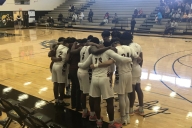You have /5 articles left.
Sign up for a free account or log in.

Josh Rosen | Instagram
While a guest on a radio show in May, Jim Mora, head football coach at the University of California, Los Angeles, was asked about some social media posts shared by one of his players.
In April, Josh Rosen, UCLA’s quarterback, posted an image on Instagram of himself golfing at a course owned by Republican presidential nominee Donald Trump. In the photograph, Rosen is wearing a hat emblazoned with the words “Fuck Trump.” On the radio show, Mora said he had talked to the player about his career path and social media presence (Rosen has also posted photos critical of UCLA’s record-setting $280 million apparel deal with Under Armour).
“If you’re going to go out on Donald Trump’s golf course and wear a hat that says ‘Fuck Trump,’” Mora said he told Rosen, “you’re heading toward Johnny Manziel. So let’s head toward Peyton Manning. Let’s head toward Tom Brady. Let’s head toward Troy Aikman.”
Manziel was a star quarterback in college, but his short NFL career has been marked by allegations of alcohol abuse and domestic violence. The other men listed by Mora are all football players with long professional careers and large fan bases.
The university has said the comments should be interpreted as sound career advice, but some critics view the statement as an admonishment meant to discourage the player from sharing his political views. While Mora said during a media conference in July that he does not plan on censoring his player and only meant to encourage Rosen to be “socially responsible,” an op-ed in the Los Angeles Times last week renewed the debate.
Peter Drier, a politics professor at Occidental College, and Kelly Candaele, a film producer known for making the documentary that inspired the film A League of Their Own, criticized Mora for telling Rosen to emulate only politically conservative football players. They questioned the wisdom of comparing Rosen’s social media posts to the behavior of Manziel, a football player whose career troubles stem from domestic violence and substance abuse.
Athletes have a right to speak out, they wrote, adding that “Josh Rosen needs to sharpen his analysis, not shut his mouth.”
“Maybe Mora was merely trying to give Rosen some friendly career advice: don’t alienate fans or jeopardize potentially lucrative commercial endorsements,” Drier and Candaele wrote. “But Mora's picks for positive role models fit into a disturbing pattern in college sports: outspoken conservatives are admired and forthright liberals, not so much.”
Joshua Rupprecht, UCLA’s assistant athletic director, said the op-ed was unfair. Mora, Rupprecht said, was only referencing Rosen’s use of profanity, not his political opinions, and that the coach's choice of role models was not based on their conservative views.
“Coach Mora nor the athletic department limit our student-athletes' free speech or ability to post their views on social media,” Rupprecht said. “In fact it is quite the opposite. We encourage them to find their voice, that's what college is about. As Coach Mora and others have often indicated, in doing so, we want them to be educated on what they actually speak out about and be able to back up their thoughts with intelligent discourse.”
In an email Tuesday, Dreier and Candaele defended their view, arguing that it’s noteworthy that Mora chose Tom Brady, a supporter of Donald Trump, as someone Rosen should emulate after the player criticized the presidential candidate. “The reality is that the culture of big-time college sports discourages athletes from speaking out on social and political issues,” they said.
While Rosen’s posts struck an irreverent tone, they aren’t the only time in recent years that college athletes have taken a stand over political, social or athletics issues.
In 2013, players at Grambling State University, a historically black institution in Louisiana, boycotted football over administrators’ refusal to address poor facility conditions, excessively long bus travel to games and other issues. The boycott caused the university to forfeit a game against Jackson State University, leading to a lawsuit against Grambling. The game was meant to be Jackson State’s homecoming, and that university said the Grambling team’s no-show performance cost it millions of dollars.
When Tim Wolfe announced his resignation as the University of Missouri System’s president in November, the decision came after weeks of demonstrations over the president’s handling of a string of racist incidents on campus. Student and faculty groups had been calling for Wolfe’s resignation, and a graduate student went on a weeklong hunger strike, vowing he would not eat until Wolfe was “removed from office or my internal organs fail and my life is lost.” Then at least 30 members of the university’s football team linked arms with the hunger striker and gave an ultimatum: if Wolfe didn’t resign, they would boycott all football-related activities.
That included a game scheduled just days later. While it would be an exaggeration to attribute Wolfe's resignation -- and that of the Columbia campus's chancellor, R. Bowen Loftin -- largely to the players' actions, their well-publicized strike certainly helped tip the scales and highlighted what kind of economic power athletes hold.
At a meeting of the Knight Commission on Intercollegiate Athletics in May, Arne Duncan, the former U.S. secretary of education and a new member of the commission, wondered aloud if any other athletes had threatened to strike. Recalling the antiracism protests at Missouri, Duncan asked if college players would consider organizing similar boycotts over athletics issues like concussion policies or name, image and likeness rights. Rollins Stallworth, a former Stanford University football player and chair of the Pac-12 Conference’s Student-Athlete Advisory Committee, revealed that two of Stanford’s team captains boycotted football-related activities last year during summer workouts.
For the third summer in a row, he said, the university was late in providing players with scholarship money for participating in the camps. The protest was not nearly as dramatic as the strike at Missouri, Stallworth said, but “seeing the effect of two of our teammates doing that and what goes on in the locker room, the discussion that happens, you can see the potential that could happen.”
Whether it's full boycotts or tweets containing the F word, Dan Lebowitz, executive director of Northeastern University's Center for the Study of Sport in Society, said, “We’re in a time where people are really having a discussion about what athlete activism looks like.” Lebowitz points to LeBron James, of the National Basketball Association’s Cleveland Cavaliers, as an athlete who is unafraid of using his platform to highlight social justice issues.
In 2012, while a member of the Miami Heat, James tweeted an image of himself and his teammates wearing hooded sweatshirts in reference to Trayvon Martin, the unarmed black teenager shot to death by George Zimmerman. In 2014, after the death of Eric Garner, James and his teammates wore black warm-up T-shirts that stated “I can’t breathe.” Garner had died earlier that year after being placed in a choke hold by a New York police officer. Garner repeated, “I can’t breathe” 11 times in the moments before his death.
James isn’t the only athlete making such statements. Last month, players for the New York Liberty, a Women’s National Basketball Association team, wore black T-shirts bearing the words #BlackLivesMatter and #Dallas5, in reference to black men killed by police and the police officers murdered in Dallas. In a July Instagram post, Carmelo Anthony, a forward for the New York Knicks and a longtime member of the U.S. national basketball team, called on other athletes “to step up and take charge” by using their high-profile status to help combat racism and gun violence.
The difference between James, Anthony and the Liberty and athletes like Rosen, Lebowitz said, is that Rosen is a college student.
“College athletes have this platform, but they are ostensibly governed by the university and the National Collegiate Athletic Association,” Lebowitz said. “We’re seeing this tension between universities and athletes, where it's assumed that athletes will strictly conform to the fact they’re governed by colleges and that they have to worry about what they say and how that could affect their scholarships. And yet against that backdrop, athletes are starting to understand the enormous power they have. The question is, in a country of free speech, where athletes enjoy a platform of visibility, does he or she have a social responsibility to use that platform to speak up for people?”
Colleges, including UCLA, provide athletes with guidelines on how to use social media. UCLA’s student-athlete handbook calls social media a “balancing act.” The university encourages and fully supports freedom of speech, the handbook states, but it also asks that athletes “be cognizant of the fact that you are representing yourself, UCLA and the athletic department” every time they use social media.
Teresa Valerio Parrot, principal of TVP Communications, a public relations firm, said it’s common for coaches and athletic departments to keep a close eye on athletes’ social media use. And with this year’s presidential election conjuring strong emotions, the kind of tension that can come from such monitoring is likely to continue.
“Athletes live under a microscope, and institutions try to provide guidance,” Parrot said. “I think campuses will have a heightened awareness of social media use this year as athletes engage with some very polarizing issues across the country. Colleges are going to have to walk very carefully through some minefields.”

![First text message: "Yes?" Second message: "This is embarrassing to say, but law school isn't fair for us men, the women are always outperforming us at [sic]. It's obvious women are taking over the legal profession nowadays." Third text: "Who is this?"](/sites/default/files/styles/image_192_x_128/public/2024-09/Text_messages_law_2.jpg?itok=0QWP419B)






